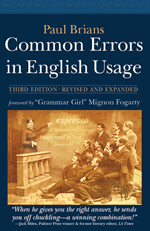crucifiction / crucifixion
yanira.vargasOne might suppose that this common misspelling was a product of skepticism were it not for the fact that it most often occurs in the writings of believers. The word should make clear that Jesus was affixed to the cross, not imply that his killing is regarded as a fiction.
BUY THE BOOK!
